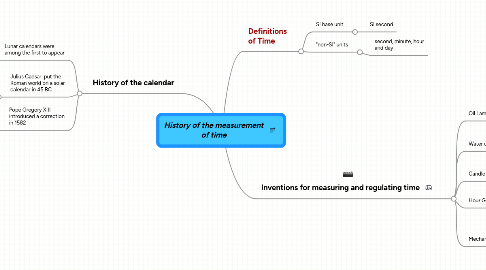
1. History of the calendar
1.1. Lunar calendars were among the first to appear
1.1.1. Lunisolar calendars have a thirteenth month added to some years to make up for the difference between a full year
1.2. Julius Caesar put the Roman world on a solar calendar in 45 BC
1.2.1. This Julian calendar was faulty in that its intercalation still allowed the astronomical solstices and equinoxes to advance against it by about 11 minutes per year
1.3. Pope Gregory XIII introduced a correction in 1582
1.3.1. The Gregorian calendar was only slowly adopted by different nations over a period of centuries (is today by far the one in most common use around the world)
2. Definitions of Time
2.1. SI base unit
2.1.1. SI second
2.2. "non-SI" units
2.2.1. second, minute, hour and day
3. Inventions for measuring and regulating time
3.1. Oil Lamps
3.1.1. To devise a way of measuring the level in the oil reservoir to measure the passing of time. (found in China at 2,000 BCE )
3.2. Water clock or clepsydra
3.2.1. Found in the tomb of Egyptian pharaoh Amenhotep I (1525–1504 BC)
3.3. Candle Clocks
3.3.1. Found in China from the sixth century CE
3.4. Hour Glasses or Sandglasses
3.4.1. From some time in the 14th century,were used as a measure for periods of time
3.5. Mechanical clock
3.5.1. the first clock escapement mechanism appears to have been invented in 1275
3.5.1.1. first drawing of an escapement was given by Jacopo di Dondi in 1364
3.5.2. More Accurate Mechanical Clocks
3.5.2.1. Made byJohn Harrison in 1761
